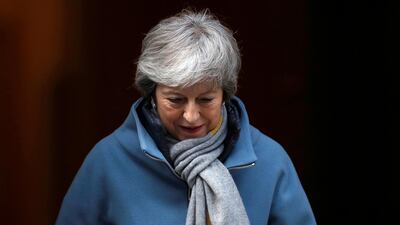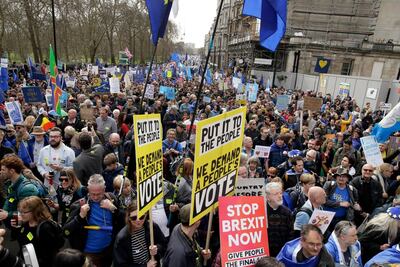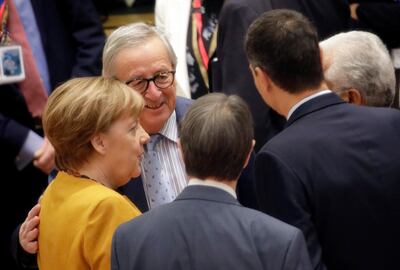The UK has reached a point where political and constitutional crises erupt on a near-daily basis. Dramatic twists and turns reveal themselves more or less by the hour. The cause of this chaos is Brexit – and more precisely the long, tortuous and still unresolved search for a smooth departure from the European Union.
Britain was supposed to have formally split from the EU at 11pm, UK time, on Friday. Instead, with its politicians unable to agree on how to depart, it remains in limbo.
The last few turbulent days have been both historic and typical. On Wednesday, Theresa May told a meeting of Conservative MPs that, if they backed her Brexit deal, she promised to resign as prime minister before the next phase of negotiations. This was an extraordinary moment. In effect, she was saying to her own parliamentary party: "You want me out. OK, I'll go, provided that you support an interpretation of how the UK should leave the EU that most of you don't agree with. Back me, then sack me."
Meanwhile, in an unprecedented move, some MPs sought to take Brexit out of the government’s hands. More expedient backbenchers from across the House of Commons debated alternative options to Mrs May’s deal. They were figures emerging from the darkness, exploring for the first time the scope for parliamentary consensus. Briefly, British politics took a break from Mrs May’s adversarial dance with her own Brexit hardliners and put practicalities first.
At the end of that historic debate, MPs took part in a series of "indicative votes", their first attempt to coalesce around a different vision to that of Mrs May. They failed to do so. All eight alternative options – ranging from leaving the EU with no deal to cancelling Brexit altogether – were defeated. The plan is now that a final decision will be reached next week. The options appear to point to a soft Brexit, or no Brexit at all if the nation's elected representatives can't agree on a single credible route to leaving the EU.
But Mrs May will not let go of her deal. She has twice been heavily defeated in the Commons, yet is warning hardline Brexiteers that they must support her approach or risk a much softer departure than they want. Some are now declaring that they will back her, for fear of no Brexit at all.
Parliament’s new-found assertiveness and Mrs May’s stubbornness provide an explanation for the depth of the UK’s political crisis. There are many active players within this process and – contrary to all the claims that Brexit would help the UK take it back – not one of them is fully in control.
Usually in British politics, the prime minister is something close to all-powerful. Mrs May has at times seemed almost powerless. MPs defy her regularly and her cabinet ministers frequently resign. That cabinet is not in a commanding position. Nor is the UK parliament. Nor are British voters. And nor is the European Union. Each is playing its part in Brexit with little idea of what will happen or why.
Mrs May’s deal, negotiated with the EU, was unveiled last November. It ends the free movement of labour between the UK and EU nations, and allows the UK to negotiate its own trade deals. But this withdrawal agreement answers no questions about Britain’s future relationship with the EU. It is also far from clear on how a soft border would be maintained between Northern Ireland and the Republic of Ireland, an issue that has proved unexpectedly complex and contentious. It is a leap in the dark.
That doesn’t seem to matter to Mrs May. When she loses a parliamentary vote on anything to do with Brexit, she keeps going as if nothing has happened. In the hope of bludgeoning MPs into submission, she has from the very beginning threatened them with either no deal or no Brexit. She is not a natural persuader. In fact, as one cabinet minister told me, “She’s pathologically inflexible.”
However, Mrs May cannot command a parliamentary majority. In another twist on Wednesday, the Democratic Unionist Party indicated that it would not be backing her deal. After a hastily called general election in May 2017 resulted in a hung parliament, she has depended on this Northern Irish party to pass legislation, but its members have proven unreliable allies.
For the past three years, Mrs May has been a ghostly presence as prime minister. She rarely gives interviews or lengthy press conferences. This is unusual among UK leaders, who tend to enjoy politics as theatre. As far as Brexit was concerned, she had hoped to deliver “the will of the British people” by negotiating with little public or political scrutiny. Soon after becoming prime minister in July 2016, she said that she wanted “no running commentary” on the matter. The commentary has never stopped. She is the only one who has not spoken much.
Mrs May is shy and awkward, yet confident in her abilities. Accordingly, a pattern has formed in which she imperiously seeks to undermine the centrality of parliament.
The UK courts ordered that parliament should have a say on the triggering of Article 50, the mechanism that legally began the Brexit process. MPs imposed a “meaningful vote” on her deal. She did not want to make that concession. Her government was found to be in contempt of parliament, for which she has never apologised. Recently, in a poorly judged TV broadcast, she placed herself with “the people” and against parliament. Some MPs compared her performance to the divisive populism of US President Donald Trump.
Parliament’s unique assertiveness last Wednesday does not mean that MPs are fully in control, though. Parliament cannot initiate legislation or negotiate with the EU. Only the government can. To be more precise, the prime minister is the main negotiator. Yet Mrs May has struggled to persuade her own parliament of anything.
The circuitous nature of the paralysis affecting Brexit goes even much deeper than that. Mrs May cites the 2016 referendum result as the basis for her actions, but the precise form that Brexit would take was never defined in that vote, and now "the will of the people" is far from clear. Hundreds of thousands marched in London last weekend, calling for another referendum that offers the option for the UK to remain in the EU. A petition on the government's website, calling for Article 50 to be revoked, which would immediately end any possibility of Brexit, has attracted millions of signatures.
The dour and reserved Mrs May would probably prefer to perform live in a West End musical than conduct such a screeching U-turn, but a few of her own Conservative MPs are now urging her to give up on the whole idea.
Another big player is the Labour party, the Conservatives’ main opposition. Jeremy Corbyn, Labour’s leader, has had even less to say publicly than Mrs May. This appears to be an attempt to please both Brexit-supporting Labour voters – of which there are many – and his party members, who are, on the whole, ardent Remainers. The only clarity he offers is his firm opposition to Mrs May’s deal and to leaving with no deal. What he actually wants is unknown.
Then there is the European Union, which holds most of the cards. At a summit held last week in Brussels, Mrs May asked for an extension of Article 50 until June. The EU offered a delay until April or May. Its leaders do not want the UK to crash out without a deal, but seem to be rapidly losing patience with Mrs May.
Amid all of this chaos, the UK is in a state of panic. No one knows what is going to happen from one day to the next, and there may be worrying longer-term consequences. Among these concerns is the possibility of a rise in nationalism in Scotland and Northern Ireland, which could lead to renewed calls for independence and put the entire future of the UK at risk.
This hysteria coexists uncomfortably with a crushing sense of political paralysis. If Mrs May finally succeeds in securing parliamentary support for her deal, the drama of Brexit is only just beginning. The next phase, which will involve negotiating future trading arrangements with the EU, will be even more challenging.
Political observers often speak of the "European curse". Following in the footsteps of Margaret Thatcher, John Major and David Cameron, Mrs May will be the fourth successive Conservative prime minister to fall foul of the UK's relationship with its continental neighbours. If things do not change significantly and fast, it is safe to say that she will not be the last.
Steve Richards' latest BBC series, Theresa May – The Brexit Prime Minister, can be heard on BBC Radio. His next book, Modern Prime Ministers – The Lessons of Leadership, is published in September



